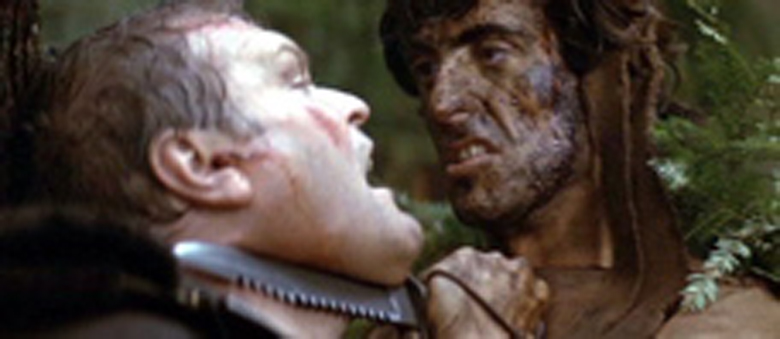Reviews
Ted Kotcheff
USA, 1982
Credits
Review by Cullen Gallagher
Posted on 23 June 2009
Source Lions Gate DVD
Categories Favorites: The Action Movie
The woods are lovely, dark, and deep,
But I have promises to keep,
And miles to go before I sleep,
And miles to go before I sleep.
—Robert Frost, “Stopping by Woods on a Snowy Evening”
Rambo’s cinematic nativity First Blood borrows significantly from America’s pastoral heritage. Like some mythological figure, he - among the most iconic of action heroes - is inexorably connected to the woods—they gave birth to him (in more ways than one), and it is to the woods that he both continually comes and goes. Tempting as it is to rhapsodize over the many awesome things Rambo does in the movie - from ambushing the police in the woods to his one-man apocalypse that brings a city to its knees - it’s crucial to consider the natural progression of the film itself. Bits of action are orchestrated between largely atmospheric sequences that not only call attention to the gorgeous location photography shot at Golden Ears Park in British Columbia, but also carry an ethereal presence not often associated with the action genre. An elegiac prologue at a country home gives way to a slow burning urban paranoia that culminates in a chase leading back to the woods. Always back to woods, like an irrepressible refrain. Something innate within Rambo beckons him to return to nature, a call of the wild to which he always answers.
As the credits fade away, a pastoral country landscape materializes on-screen. The fallen leaves, dead and decaying, are a lovely shade of burnt sienna. A large tree stands at the right edge of the frame, and its branches extend over the entire length of the shot, hanging down like tassels. On the left side of the frame is a faded red shack whose black tiles are turning grey like the hair on an old man’s head. In between the tree and the shack is a dirt road, curving deep into the woods far beyond the sight of the camera. From beyond the horizon comes John J. Rambo. He’s leaving the wilderness behind and coming towards us, towards civilization.
Making first contact, right away he’s disappointed with what he finds. The man he was seeking out - Delmore Berry, the other sole-surviving member of his team from Vietnam, his only living friend - is dead. Cancer killed him, a sickness given to him by the United States Military in the form of Agent Orange. The poisons of technology and unforgivable betrayal and injustice send Rambo back to the wilderness, more alone than ever before. The modern world is evil; nature is pure.
When he re-emerges, he’s in the town of Hope, Washington. “Welcome to Holidayland,” a banner ironically reads. The time now is Christmas, and the cinnamon hues of autumn have given way to an icy gray - colorless and uninviting. How long has Rambo been in the woods? What has he been doing? Where has he been? Reference is made to him trying to work as a valet, but no specific time frame is given. For all we know, this is the first time that he has left the wilderness in some months, the first time he has left home. As when a deer wanders onto a highway, Rambo’s only reason for returning to civilization is that he has lost his way.
And Sheriff Will Teasle is there to put him back on “the right path.” Picking up the drifting Rambo, Teasle takes him to the town limits, drops him off, and points him in the other direction. But for once, Rambo doesn’t head back to the woods. He heads back to civilization. Here the conflict begins: between the law of man and the law of nature, of which Rambo is representative. Arrested for vagrancy, Rambo is heckled and tortured by the sheriff’s department, but still he refuses to speak until a flashback to his time as a P.O.W. in Vietnam breaks his placidity and unleashes continents of repressed rage. Single-(and bare-)handedly pummeling the entire department, Rambo steals a civilian’s motorcycle and takes to the woods. Teasle and his men follow only to discover they are not the predators, but the prey. This, unlike the city, is Rambo’s territory, his natural habitat.
Woods are significant in First Blood for a number of reasons. First, it was in the jungles of Vietnam that Rambo the Soldier was born; in battle, it is only logical that he would lead his opponents to his home turf where he would have the advantage. Second, if Rambo feels that his role in the Vietnam War has gone overlooked by his fellow countrymen, it is fitting revenge that Rambo would bring the war back home to them, and place them in the position that he was for so many years: crouched in the jungle, gun in hand, fighting for his life. Third, Rambo is cast in the mold of a nineteenth century pioneer, gone West to settle. Or perhaps his genealogy goes back to Natty Bumppo, the white child raised by Native Americans in James Fenimore Cooper’s series Leatherstocking Tales—both warriors share a common bond with the forest, and a deadly accuracy with their weapons. He is, after all, in Washington, and if First Blood can be considered his Manifest Destiny, then Rambo has run out of places to go. He was, quite literally, kicked out of Hope—one can’t spell out Rambo’s predicament any clearer.
But on a deeper level, the wilderness symbolizes Rambo’s attempt to escape not only from society, but from history. Rambo’s wish is to return to a pre-modern era, to life before Vietnam, and - one is led to believe - before “Rambo.” Even though he has the reputation of the deadliest, most expertly trained Green Beret, his weapon of choice is not the gun, but his trusty knife. One also gets the feeling that Rambo would love to go back to a time in which he was nothing more than a “John,” or perhaps a “J.J.” to a few close a friends. At points, he even seems to regress to an almost Neanderthal state of being. Sitting alone in a cave, roasting wild boar (which he caught using a spear he fashioned by hand) over an open fire, he seems to resemble a cave man, or that mythological martyr Prometheus.
This instinct in Rambo to head back to the wilderness is an on-going cultural trope throughout American letters. Donald Westlake, that master of modern hardboiled crime fiction, has also written about this deep connection between the American character and landscape. “One of our continuing myths was summed up in Huckleberry Finn: Our escape, what we think of as our escape, is that we can always light out for the territories. Well, we really can’t, not anymore, but that’s part of the American character—that belief that at any moment, I could just drop the coffee cup and disappear.”
Both Rambo and the world are conflicted about this possibility of “disappearance.” On the one hand, the sheriff would like nothing better for Rambo to drop off the face of the earth and never be heard from again—it would certainly make his job easier. But the notion that someone as lethal and vengeful as Rambo could slip through his fingers undetected and turn up anywhere, at anytime, is spine-chilling. Society would also like to forget Rambo, because he symbolizes the real trauma of a war that for them is in the past, like yesterday’s headline. Part of Rambo, as well, would like to say (to quote Robert Graves, writing about another war), “Good-bye to all that.” But he can’t—as Robert Frost wrote, he still has “promises to keep” and “miles to go before [he] sleep[s].” He is unwilling to let what he and his fallen brethren endured and sacrificed during the war to be forgotten by their country.
One can even detect traces of Henry David Thoreau’s Walden in Rambo’s character: “I went to the woods because I wished to live deliberately, to front only the essential facts of life…. I wanted to live deep and suck out all the marrow of life, to live so sturdily and Spartan-like as to put to rout all that was not life, to cut a broad swath and shave close, to drive life into a corner, and reduce it to its lowest terms.” Both Rambo’s and Thoreau’s journeys speak of a severe social discontent, a distrust of the modern world, and a fear that it might - or maybe even unknowingly has - corrupted them. It’s also a place of spiritual renewal—not a permanent retreat, but a temporary residence to prepare for a return to civilization. Thoreau wrote that his mission was to “reduce [life] to its lowest terms, and, if it proved to be mean, why then to get the whole and genuine meanness of it, and publish its meanness to the world.” Rambo discovered not only the meanness of life, but particularly of people. And like Thoreau before him, he wanted to “publish” his findings—but with a very un-Thoreauvian vengeance. Instead of a pen, Rambo uses a very large machine gun.
Eluding the law and its dragnet of Dobermans, National Guard reserves, rocket launchers, helicopters, and bloodthirsty sheriffs, Rambo returns with a single desire: to (literally) destroy Hope. He crashes a stolen Army truck into a series of gas pumps and proceeds to gratuitously ignite the spreading pool with his M-60 machine gun. Shooting power lines causes a city wide black-out; blowing up a gun shop provides noisy cover to hide his whereabouts, destroying some of the enemy’s ammunition and thus limiting their defense; shooting the windows of storefronts serves little practical purpose except to let Rambo blow off some steam. It’s significant that this outburst of violence is aimed not at people, but at buildings and consumerist commodities, because deep down Rambo is not a killer like the world thinks he is. Unlike the later films in the series that rack up corpses like points in a pinball game, First Blood has a total body count of one. While a deputy disobeying orders leans out the door of a helicopter and opens fire, Rambo hurls a stone at the helicopter, which causes it to momentarily lose balance, sending the officer plummeting to his death. An act of self-defense, Rambo is morally and even perhaps legally exonerated.
Shooting up the town, the M-60 becomes Rambo’s voice. Up until the last scene, Rambo hardly speaks a word. Most of star Sylvester Stallone’s dialogue is grunts, panting, yells, screams, and even cries. And this lack of speech appears to be one of the chief sources of conflict in the film. When Sheriff Teasle first picks him up, he asks where Rambo is headed. Rambo replies, “North.” Teasle then asks if he is headed to Portland, and Rambo says that he is. Rhetoric is already working against Rambo, because Teasle has him caught in a lie: Portland is south, not north. Strike one against Rambo. That its, almost quite literally, the last time Rambo speaks in the movie. And certainly it is the last time he answers any questions: he repeatedly refuses to respond when he is arrested, which only infuriates the deputies even more. Trapped in the mountains, he breaks radio silence only to speak to Col. Trautman, his former military officer and trainer who, by his own admission, has come out to save the world from Rambo. This marks the first glimpse we have into Rambo’s psyche. Talking in the same code used during the war, he mourns the deaths of his fellow soldiers, but refuses to give up his vendetta against the law enforcement of Hope: “They drew first blood. They drew first blood.”
The second conversation, in the final scene of the movie, is also with Col Trautman. The police have surrounded the building, and Rambo is loading his arsenal of guns in preparation for a final showdown. He’s ready to die, ready to join his fallen friends in one final battle. But then Rambo silences the guns and begins to speak for himself. He can’t hold a menial job here in the states, but over in Vietnam he commanded million-dollar equipment. The only friends he knew are dead. The country he served doesn’t seem to care anymore. Upon returning home, he didn’t receive the hero’s welcome he was promised; instead, he was called “baby killer” and harassed for doing what he was initially told was his duty. The world doesn’t make sense to Rambo, and he doesn’t know what to do.
In order to complete the cycle of transformation, Rambo regresses to the one stage he hasn’t yet: the child. Leaning against his Trautman, Rambo begins to weep. It’s a moment of sincere vulnerability that Stallone pulls off brilliantly. How can a man that has leapt off a rocky cliff into the thick of the forest and survived - who has sewed his own arm without anesthetic, who hunts wild boar with his bare hands, who survives a rocket launcher attack on a mine shaft, who does a thousand other heroic things that became my dreams as a child, that became the standards of manhood which I never could reach - how could this man cry with such earnest abandon and not come off as phony? If, like me, you’ve remained invested in Rambo’s character this whole time, this final scene is a cathartic apotheosis.
Regardless of all the shooting and explosions during this last sequence, the climax of the movie is arguably this: one man letting his guard down, and another embracing him. It’s indicative of the fraternal bond that is so crucial to the action genre. (It’s worth noting that there is only one female speaking role in First Blood in the opening scene, and maybe a dozen extras that can be clearly counted.) It also suggests that there is more to Rambo than just his sweaty, scarred muscles and near-inhuman endurance. Beneath the beefcake, there’s a complex character with unresolved ambiguities and contradictions. Subsequent entries in the Rambo series would offer changes to his persona (some more pronounced than others) and would also focus more on action rather than character. But therein lies the uniqueness and the unresolved contradiction of First Blood: it is both one of the leading archetypes of modern action filmmaking and an anomaly that defies the pervasive notion that the genre is nothing more than escapist pyrotechnics.
More Favorites: The Action Movie
-

First Blood
1982 -
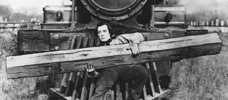
The General
1926 -
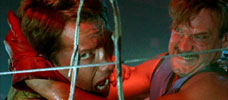
The Running Man
1987 -

Guns
1990 -
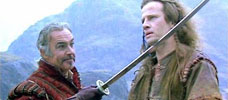
Highlander
1986 -
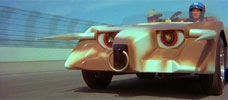
Death Race 2000
1975 -
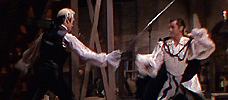
Scaramouche
1952 -

Do or Die
1991 -
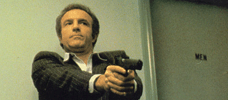
Thief
1981 -

Mission: Impossible
1996 -
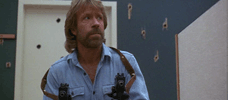
Invasion U.S.A.
1985 -

Rambo: First Blood Part II
1985 -

Bullitt
1968 -

Hard Hunted
1992 -
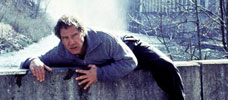
The Fugitive
1993 -
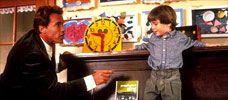
Kindergarten Cop
1990 -
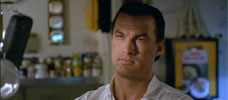
Under Siege
1992 -
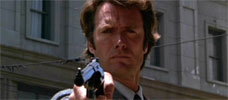
Dirty Harry
1971 -
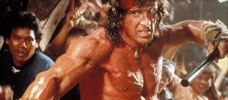
Rambo III
1988 -
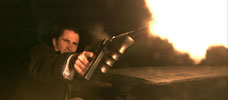
Public Enemies
2009 -
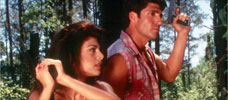
Day of the Warrior
1996 -

The Good, the Bad, the Weird
2008 -
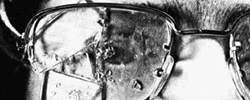
Straw Dogs
1971 -
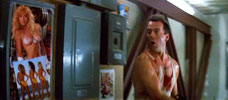
Die Hard
1988 -
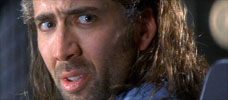
Con Air
1997 -
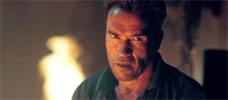
Collateral Damage
2002 -
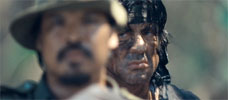
Rambo
2008
We don’t do comments anymore, but you may contact us here or find us on Twitter or Facebook.



